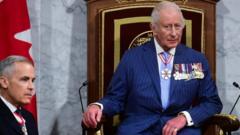In a significant display of royal support, King Charles III addressed the Canadian parliament for the first time in almost half a century, setting a tone of national pride and sovereignty. His speech, marking the opening session under the newly elected Prime Minister Mark Carney, comes at a time of heightened concerns regarding relations with the United States, particularly following remarks from President Donald Trump that undermine Canada’s autonomy.
The King opened his remarks with a strong appeal for patriotism, acknowledging the complex trade dynamics as Canada navigates an impending trade war with its largest economic partner, the US. “The True North is indeed strong and free!” he proclaimed, invoking a sense of unity and national identity.
Significantly, the monarch embraced Canada’s evolution into a "bold, ambitious, innovative country," contrasting its present with its past when Queen Elizabeth II last opened parliament in 1957. He affirmed the Crown's symbolic role in maintaining stability and continuity in Canadian society.
Although the President remained unnamed, the tension with the US was palpable, especially after Trump suggested on social media that Canada should consider becoming the 51st state. The King’s emphasis on maintaining Canadian sovereignty serves as a clear reflection of the current political climate.
The address also delved into Canada’s place in a rapidly changing global landscape, addressing the economic uncertainties and the urgent need for reinforced trading relationships. King Charles articulated a vision for Canada’s future: a nation ready to embrace a monumental economic transformation, with aspirations of becoming more competitive and innovative on the world stage.
On domestic policy matters, the King outlined the Liberal government's plans to expedite infrastructure projects and promote Indigenous ownership in major developments. A legislative proposal aimed at removing trade barriers within Canada is slated for introduction by July, which could potentially save the economy billions.
Housing affordability, a critical issue in recent elections, received attention too, with commitments to increase housing supply and reduce costs for first-time buyers. The government aims to initiate the construction of 500,000 homes annually and cut taxes on affordable housing.
As for defense commitments, with pressure from NATO allies, Canada intends to ramp up military spending to meet the 2% GDP target by 2030, including increasing its military presence in the Arctic.
Opposition leaders have raised concerns about the specificity of proposed policies, particularly in areas like climate change and social justice. As Canada stands at this crossroads, the King's address resonates with a reaffirmation of purpose and unity amidst uncertainty.




















